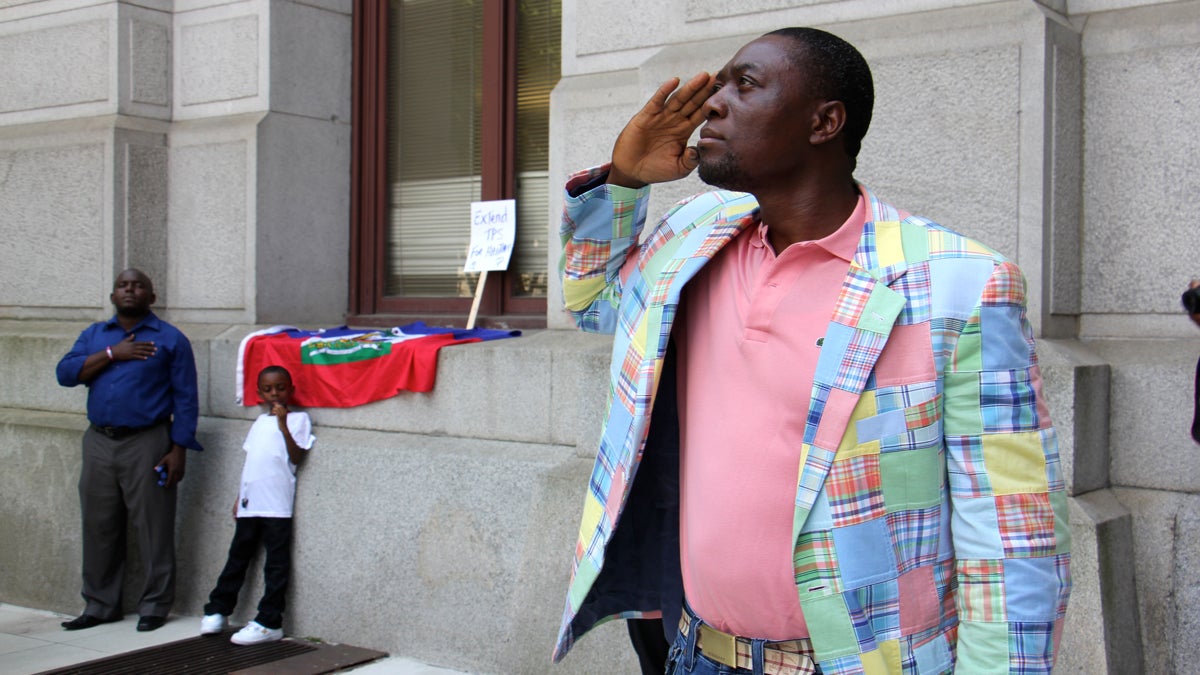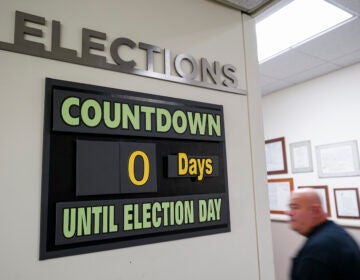With temporary status extended for six months, Haitians in Philly cast wary eye toward future
Listen
Haitians salute as their country's flag is raised in front of City Hall during Haitian Flag Day, May 18. The federal government has extended temporary protected status for Haitians living in the U.S. (Emma Lee/WHYY, fie)
Haitians in the Philadelphia region breathed a sigh of relief Monday as the U.S. government announced it was extending a kind of temporary immigration immigration status for that group.
But the announcement came with a message that the U.S. is winding down the program, causing concern among some.
The Department of Homeland Security extended “temporary protected status” for Haitians for six months, instead of the usual 18-month renewal.
“That’s what they put on the table, but the reality can’t happen like that,” said Giordani Jean-Baptiste, vice president of the Haitian Coalition of Philadelphia. “In six months, you can make a plan to leave, but make a plan to go where?”
Jean-Baptiste, who last visited his home country in February, and other Haitians point to continued food shortages and lack of housing as signs that their country will not be ready for an influx of people if the status ends in six months. In late 2016, Hurricane Matthew caused widespread damage in southern Haiti, flattening buildings, damaging crops and killing more than 1,000 people.
In a statement released Monday, DHS Secretary John Kelly said he believed Haiti could soon phase out of “temporary protected status,” an immigration standing reserved for countries in extreme distress, usually due to natural disasters or a civil war.
“I believe there are indications that Haiti — if its recovery from the 2010 earthquake continues at pace — may not warrant further TPS extension past January 2018,” he said. “TPS as enacted in law is inherently temporary in nature, and beneficiaries should plan accordingly that this status may finally end after the extension announced today.”
Planning, he said, means preparing travel documents to return to Haiti or adjusting immigration status to stay legally after TPS. Haitians and the U.S, government agree on one thing — if you have the option, move sooner, rather than later, to adjust your immigration status.
“Once you strip the TPS blanket away, people that are under the blanket, protected by it, can be very different,” said immigration attorney Tom Griffin, who has represented many clients from Haiti. Their options resemble those of other immigrants living in the country illegally, who can apply to change their status through marriage or through a family member or by proving they were persecuted — but only under certain conditions.
Many will not leave when TPS ends, according to Jean-Baptiste, even if that means staying illegally.
In that camp is 38-year-old Ketty who fled Haiti after the earthquake.
“I will cry myself to sleep and wait to be arrested” if the status ends, she said.
Two of her three children are U.S. citizens, and she works as a nurse’s aide, making $23 per hour. She said her children are very competitive in school and she dreams of sending them to an Ivy League university, such as Princeton or Harvard.
“I just don’t want to lose opportunity and take my children back to Haiti and see them now crying for food,” she said.
More than 58,000 Haitians in the U.S. have the temporary status, which will now expire in January.
WHYY is your source for fact-based, in-depth journalism and information. As a nonprofit organization, we rely on financial support from readers like you. Please give today.




